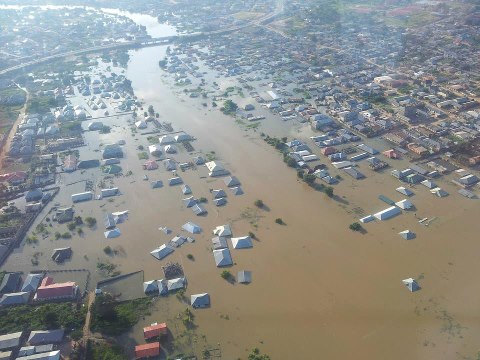Climate events and occurrences in Nigeria and every other part of the world attest to the fact that climate change phenomenon is real. Nigeria as any other country in the world is vulnerable to the negative impacts of climate change.

It is no news that climate impacts are the result of natural events and human activities, which occurred due to a rise in average global temperature. Increasing levels of carbon dioxide and other heat-trapping gases in the atmosphere have warmed the earth, and these have caused several negative impacts, which include rising sea levels, melting snow and ice, drought, flooding and more extreme weather conditions.
It is, however, worrisome that, despite all these sad realities, the Nigerian government is yet to put in place adequate measures that will enable the country adapt to the risks of a changing climate.
Evidently, people’s welfare and living conditions are threatened due to incessant flooding, drought, desertification and desert encroachment witnessed in various parts of the country. Millions of species of animals are endangered, lakes are drying up, rainfall patterns are fluctuating and increasing temperature are some of the impact felt in this part of the world.
It is important we take ourselves down the memory lane for a clearer picture of how we are being struck by climate change horrendous effects.
Lake Chad that happens to be one of the largest lakes in the world experienced an unprecedented decline by as much as 95% of its original size from about 1963 to 1998, according to the United Nations Environment Programme (UNEP). This shrinking was caused as a result of shifting climate patterns. This unexampled shrinking endangered hundreds of species of animals and left thousands of people unemployed. It also resulted into violence as to right of ownership. As if that is not enough, poverty, hunger and hatred continue to spread like pandemic in Lake Chad’s neighbouring communities such as villages in Borno State and it’s environ.
More so, incessant flooding exercise was experienced in some parts of the country in 2012, which is so far the deadliest flood disaster ever in the history of the country. It led to the death of hundreds of people, with thousands of hectares of farmland destroyed and displaced about 2.1 million people. Thirty out of the 36 states in Nigeria were affected. Kogi, being the worst affected state. accounted for 623,900 people being displaced and 152,575 hectares of farmland destroyed, according to a National Emergency Management Agency (NEMA).
The flood fury in 2012 was caused by water level rise and persistent torrential rainfall, which forced the Cameroonian government to open the Lagdo Dam that washed several countries with Nigeria inclusive.
It is quite unfortunate that the large expanse of land in the Northern part of Nigeria that can be utilised for agriculture and other economic activities has been eroded over the years due to increasing temperature and deforestation. However, desert encroachment is responsible for 350,000 hectares of land loss every year in the country and, if we are not careful, most parts of Nigeria will be greeted by desertification by 2020. Desertification and desert encroachment brings about demographic displacements in villages across 11 northern states. Thus, this and many more are the impacts of climate change in Nigeria.
Conclusively, even if we can’t do anything about natural events of climate change, I strongly believe to a large extent that we can curb human deadly activities resulting in climate change and, with the help of the government, we can make sure the average global temperature does not exceed 1.5 0C. By so doing, we will be saving our generation without compromising the ability of future generations to meet their own needs. We must always remember that, “we do not inherit the earth from our ancestors; we borrowed it from our children.”
By Alabede Surajdeen (environmentalist and SDGs Advocate; alabedekayode@gmail.com; @BabsSuraj)
